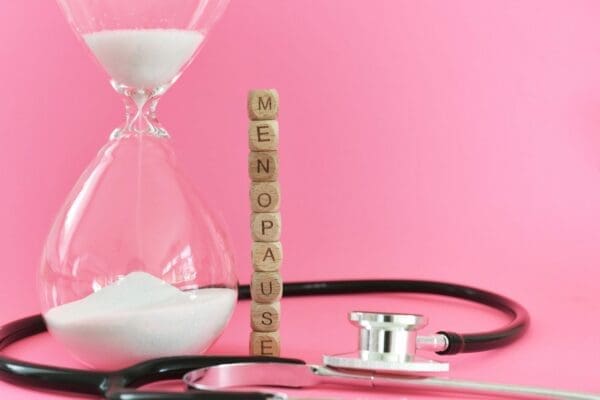Going Through Menopause can be Confusing at Any Time in a Woman’s Life…
…but trying to contend with menopause while at work can be really hard.
It’s estimated nearly one million women have left their roles because of their lack of understanding about menopause as education has been lacking for years. As all reproducing females* will go through the life event known as menopause then why do we know so little?
So What is Menopause?
It’s the end of fertility and the time in life when someone hasn’t had a period for 12 consecutive months.
What are the Stages of Menopause?
There are 3 main stages. Perimenopause, menopause see above and post-menopause.
Perimenopause is when hormones start to decline over a period of time often over several years. Many women may encounter symptoms sometimes months and years before they notice a change in their periods. At some point, periods will change. Some will bleed more and some will bleed less. Remember you can only say you are menopausal once you haven’t had a period for 12 consecutive calendar months. So in effect, you could say menopause only lasts for one day. I wish.
The final stage is post-menopause and is the day after you realise you haven’t had a period for 12 consecutive months. When I first found out about this stage I was really excited as I thought it meant menopause was over. Sadly it just means you are no longer having periods. For those who experience symptoms, this means they could go on and on for years. I have met women in their 60, 70, and 80’s who would say they are still experiencing symptoms of menopause even though they might not have had a period for 20 plus years.
Menopause can last for many years 10 years isn’t uncommon so it’s really important that women don’t just “put up with it”.

What Age Will Menopause Begin?
Most statistics will talk about the average age of menopause for women across the UK and America being 51. However many women will encounter symptoms several years before this average age.
It’s also estimated that as many as 1 in 100 women could encounter early menopause often because of chemical and medical reasons i.e .cancer treatments and surgeries such as hysterectomies. These women can be plunged into menopause literally overnight often reporting much more severe symptoms as their hormones are forced off a cliff. Most women have no idea that this might happen to them. This has to change.
We have to get away from the idea that menopause only happens to “women of a certain age”. Most will encounter this life event in their 40’s however it could happen at any time.
There are many ways women can manage their menopause my belief is that doing nothing should be one of them.
Hormone Replacement Therapy
HRT, which comes in many forms and strengths can be transformational. Those who suffer from vaginal atrophy can find the use of local HRT can be life-changing, however many women are not made aware of their options and are often not told or even worse denied the right to have access these drugs. While HRT has known risks it also has benefits.

Each person should have the right to access the facts to enable them to make an informed decision. Currently, it’s hard to get that information. The good news the medical profession has access to NICE guidelines. Even better you can access them too here. Many women I’ve met are using them in their medical consultations to help them get the treatment they need and want.
Herbs, vitamins, and vitamins can also be really helpful to lots of women but like anything you choose to put in your body getting the facts is essential. Just because something sounds natural doesn’t mean it can’t harm you. Certain options can interfere with conventional drugs so research is key.
There are lots of things we can each do for ourselves like monitor what we eat and drink. A number of symptoms can be triggered for example caffeine can be a really common trigger.
What exercise do you take? Do you smoke? Reviewing your own lifestyle and making small changes can help us all especially as we age.
What are the Symptoms of Menopause?
They can be varied and strange to the point where many women don’t make the connection that what might be happening to their mind and body might be hormone-related. Which is what makes managing menopause so difficult.
Symptoms Can Range From:
- Hot flushes/flashes.
- Night Sweats.
- Anxiety.
- Exhaustion.
- Sleep problems.
- Mood changes.
- Hair loss/gain.
- Joint problems.
- Headaches/Migraines.
- Weight gain.
- Vaginal Atrophy.
There is often an idea that there are only 34 symptoms of menopause however I have found women reporting many more than that. Itchy skin, dry eyes, the list goes on and on. My main message is if you’re in your mid 40’s and experiencing some of these symptoms it’s most likely that its hormone related however it just might not be. So if you’ve noticed a change that is different for you then get it checked out.

Menopause is a life event that will impact us all which makes it essential that workplaces enable women to work through their menopause and get out the other side.
Education is the key as most people have no idea about what to expect during menopause and the impact it may have therefore educating everyone or at the very least key people in the business is essential. The best practice would be to start with the end in mind and think about how menopause in your workplace will become business as usual.
Do you want your people to know they work in a menopause diverse workplace where menopause education is open for everyone to access? If so it’s all about small reasonable adjustments which are mostly no costs or low cost. Things like access to drinking water, reviewing hours, having a quiet place for people to take time out can all help employees feel valued and enable them to work through their menopause.
My Mission
To raise awareness about the impact of menopause in the workplace for all to enable women to work through this life event and get out of the other side. Menopause is not a condition to be treated and cured, it’s a normal stage of life that every woman goes through. Helping people to realise this is my mission. My training events are aimed at educating everyone in a fun, engaging, and informative way.
If You’d Like to Find Out More, Contact Me
- sharon@missmenopause.co.uk OR
- Join my Facebook Group.
*those in the trans community may either experience menopause-like symptoms or menopause depending upon the hormones and surgeries they undertake. Everyone will have a unique experience.
** this is not medical advice if you are concerned in any way please seek professional advice from your GP




